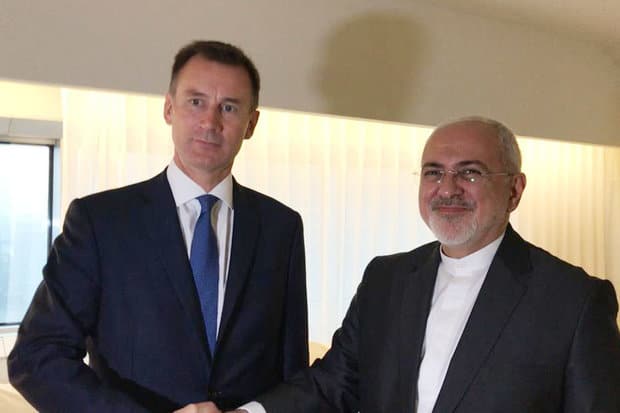UK Foreign Secretary Jeremy Hunt with Iranian Foreign Minister Mohammad Javad Zarif (File)
UK Foreign Secretary Jeremy Hunt visits Iran on Monday to discuss Europe’s response to comprehensive US sanctions on the Islamic Republic, following American withdrawal from the 2015 nuclear deal.
Britain was one of the 5+1 Powers (US, UK, France, Germany, China, and Russia) who negotiated the accord with Tehran. The UK is also central in Iran’s efforts for trade and investment links with the European Union, defying the full American restrictions that were imposed on November 5.
The Foreign Secretary said ahead of the visit that the nuclear deal is “a vital component of stability in the Middle East”: “It needs 100% compliance though to survive. We will stick to our side of the bargain as long as Iran does.”
However, he made no comment on whether the EU will support larger companies seeking to continue business with Iran, despite the threat of US fines of billions of dollars.
The UK and European partners have said they will protect small- and medium-size enterprises, and they are working with Iran on a Special Purpose Vehicle for financial transactions, including for oil purchases, to bypass the US dollar.
But the EU’s inability to guarantee its biggest firms has led many to suspend links with the Islamic Republic. They include the French energy giant Total, French auto manufacturers Peugeot and Renault, Germany’s Siemens and Deutsche Bank, the world’s largest shipper Maersk, and French aircraft manufacturer Airbus.
Hunt is also expected to raise the issue of detained UK citizens, including charity worker Nazanin Zaghari-Ratcliffe, and “destabilizing” Iranian activity in the Middle East. Discussions will include a meeting with Foreign Minister Mohammad Javad Zarif.
“I arrive in Iran with a clear message for the country’s leaders: putting innocent people in prison cannot and must not be used as a tool of diplomatic leverage,” Hunt said in his statement.
Zaghari-Ratcliffe, who works for the Thomson Reuters Foundation, was seized in April 2016 as she and her 2-year-old daughter were leaving Iran after a visit to the charity worker’s mother. She has been handed a five-year prison term for “espionage”, related to her administrative work with a BBC programme training journalists.
Iranian officials have threatened to extend the sentences. Talks in late 2017 for her release, including a visit to Iran by Foreign Secretary Boris Johnson, have collapsed.

